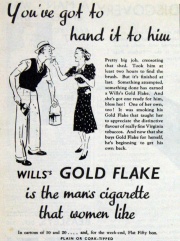W. D. and H. O. Wills
Wills of Bristol, maker of tobacco and tobacco products.
1761 Henry Overton Wills was born.
1786 The company was founded as Wills, Watkins and Co by Henry Overton Wills I and his partner Samuel Watkins, who opened a shop in Castle Street, Bristol.
1789 Partnership change. '...the Partnership lately carried on by Henry Overton Wills, Samuel Watkins, John Collins, and Aaron Northcote, in this City, in the Trade or Business of Tobacconists and Snuff-makers, under the Firm of Wills, Watkins, and Company, is, as far only as respects, the said Samuel Watkins one of the said Partners, dissolved and absolutely determined; (the said Samuel Watkins being about to enter into another Trade) and that the same will from henceforth be carried on by the other Partners exclusive of the said Samuel Watkins, Under the Firm of Wills and Company...'[1]
1791 Merged with the firm of Peter Lilly, which had a mill to grind tobacco into snuff. Lilly and Wills named the new company Lilly, Wills and Co, and they consolidated the operations into Lilly's shop at 111–12 Redcliff Street, Bristol.
1793 Partnership change. '...the Partnership between Peter Lilly, Henry Overton Wills, Richard Bowther, and Henry Cooke, of the City of Bristol, Tobacconists, carried on under the Firm of Lilly, Wills and Co. was, on the 16th Day of March last, dissolved, so far as related to the interest of the said Henry Cooke therein, who duly assigned his Share thereof to the said H. O. Wills and Richard Bowther: And notice is hereby further given, that the Concern since carried on by the said Peter Lilly, H. O. Wills, and Richard Bowther, under the Firm of Lilly, Wills and Co. is this Day by mutual Consent dissolved, as to the said Richard Bowther's Interest therein, the said Peter Lilly and H. O. Wills having purchased, and the said Richard Bowther duly assigned to them, his Share and Interest in the said Concern, which in future will be carried on by the said Peter Lilly and H. O. Wills, under the Firm of Lilly and Wills...'[2]
1803 When Lilly retired he was replaced by Samuel Ditchett, and the firm became Wills and Ditchett
1819 They changed the name of their firm, to Wills, Ditchett and Co.
1815 The company was renamed W. D. and H. O. Wills
In 1826 his two sons, William Day Wills and Henry Overton Wills II took over the company.
1831 Partnership change. '...the Copartnership between us the undersigned, William Day Wills, Samuel Ditchett, and Henry Overton Wills, under the firm of Wills, Ditchett, and Wills, as Tobacconists and Snuff-Makers, in the City of Bristol, is this day dissolved by mutual consent. — All debts due to and from the said firm will be received and paid by the said William Day Wills and Henry Overton Wills...'[3]
The company pioneered canteens for the workers, free medical care, sports facilities and paid holidays.
1846 Henry Overton Wills III joined the company.
1871 Their first brand was “Bristol”, made at the London factory from 1871 to 1974.
1870s The company led the way in branding.
1878 Three Castles and Gold Flake were introduced.
1883 Acquired two American Bonsack cigarette-making machines and the British patent rights to the design[4]
1888 “Woodbine” appeared.
1894 Capstan Cigarettes a brand of unfiltered British cigarettes made by Imperial Tobacco was launched.
In 1901, Sir William Henry Wills and others formed the Imperial Tobacco Co from a merger of Wills with many other British tobacco companies. Imperial remains one of the world's largest tobacco companies. When the company merged with the others, the company was the dominant company with a value at just under £7 million. Wills and Players eventually emerged as the UK market leaders.
1914 Embassy Cigarettes introduced.
The company had factories and offices not only in Bristol, but also in Swindon, Dublin, Newcastle and Glasgow.
1962 "Embassy" was relaunched with coupons.
The last member of the Wills family to work in the company was Christopher, the great-great-grandson of H. O. Wills I. He retired as sales research manager in 1969.
1974 The largest cigarette factory in Europe was opened at Hartcliffe, Bristol and closed in 1990. The large factory and warehouse buildings remain prominent buildings on Bristol Harbour, though they have now been converted to other uses, such as the Tobacco Factory Theatre.
1986 The Newcastle factory closed and stood derelict for over a decade, before the front of the Art Deco building - which was preserved by being Grade II listed - reopened as a block of luxury apartments in 1998.
1988 The Wills brand was withdrawn in Britain.
See Also
Sources of Information
- [1] Wikipedia
- Trademarked. A History of Well-Known Brands - from Aertex to Wright's Coal Tar by David Newton. Pub: Sutton Publishing 2008 ISBN 978-0-7509-4590-5
- Made in Bristol by David Bolton. 2011. ISBN 978 1 904537 91 5




















